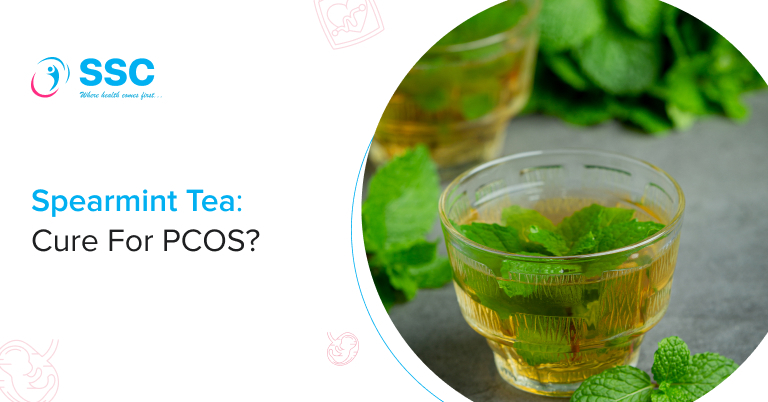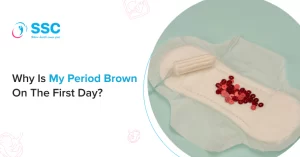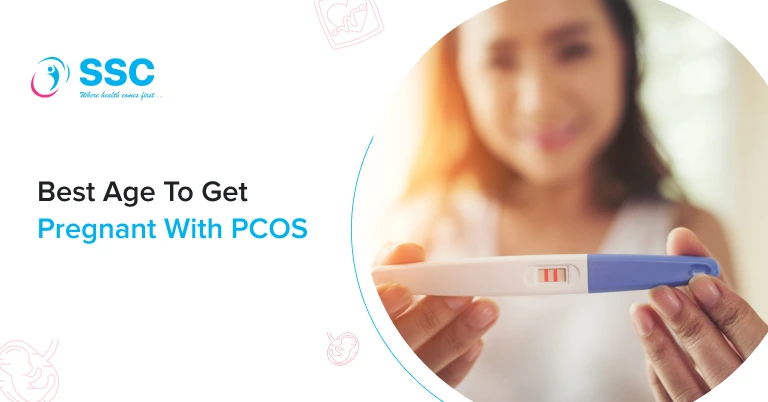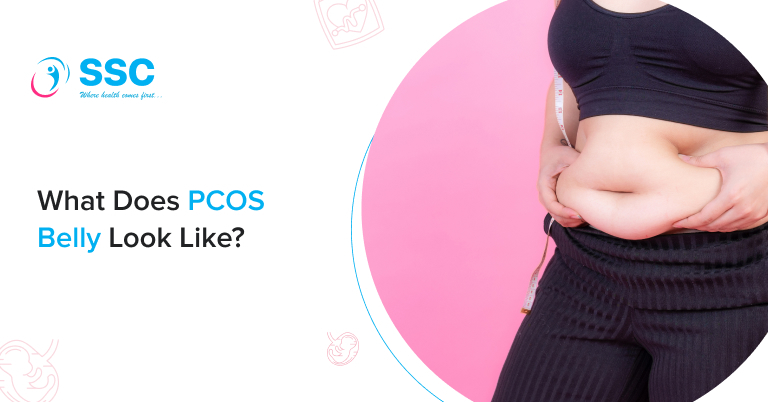Can Spearmint Tea Help Treat PCOS? How It Works?
The answer is yes. Spearmint tea helps treat PCOS by lowering testosterone levels, which are often high in people with PCOS. It could potentially prevent problems like acne and hair loss brought on by high testosterone. It helps bring testosterone back to a normal range, improving related symptoms. It may eventually slow down the growth of facial hair, but it won’t eliminate any existing abnormal hair.
In this article, we’ll dive into how spearmint tea can help reduce free testosterone levels, its anti-androgen benefits, and any potential side effects you should know about.
What is Spearmint?
Spearmint, Mentha spicata, is popularly known as “Pudina” in India. This herb originated in Europe and is popularly used in many kinds of toothpaste and chewing gums for its fresh mint flavor. Its other names include garden mint, common mint, lamb mint, and mackerel mint.
In older times, spearmint tea has been used as a natural herbal remedy for a variety of minor ailments, including digestive issues.
Additionally, it is used in a wide variety of cuisines, including sauces, desserts, and main courses. Spearmint tea provides several health benefits besides its minty taste.
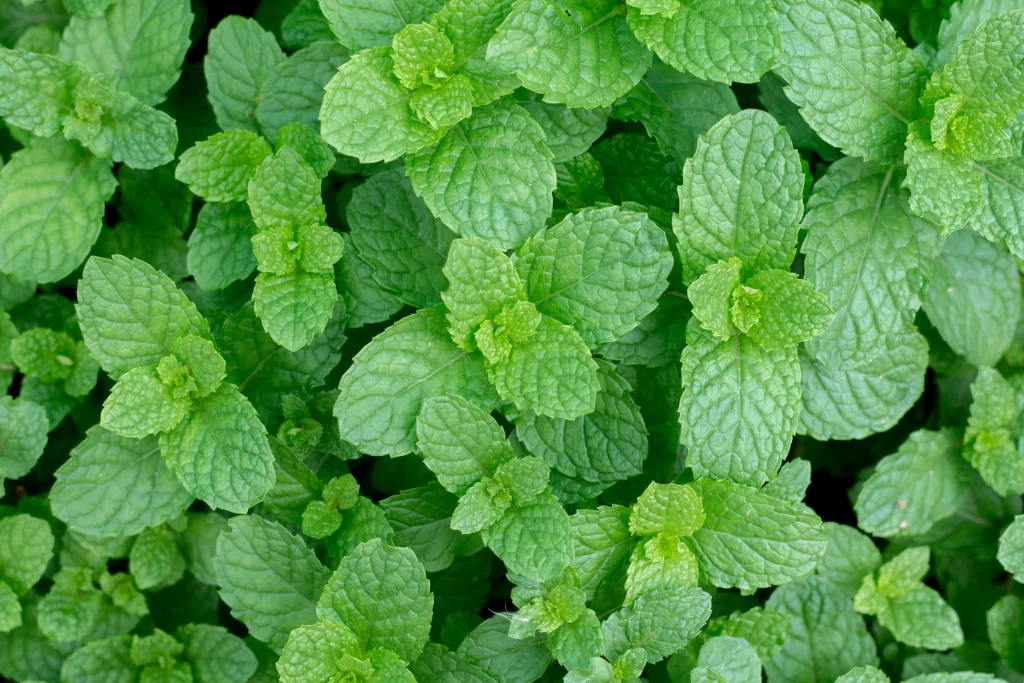
PCOS and Androgens:
PCOS, or polycystic ovarian syndrome, is a complex endocrine condition that mainly affects women. It is characterized by the ovaries producing too many androgens or male hormones, causing hormonal imbalance.
Androgens are necessary for the maintenance of several aspects of female health, such as bone density and sexual and reproductive function. However, 60–80% of women with PCOS are thought to produce high levels of androgens, such as testosterone, which can cause physical symptoms that are typical of the condition, such as weight gain, ovulation difficulties, facial hair, and hyperandrogenism.
Spearmint Tea: Anti-Androgen Effects:
Recent studies have linked spearmint tea consumption to a decrease in androgen levels, including DHEA and testosterone, which are frequently increased in PCOS patients. By reducing testosterone levels, spearmint tea may help treat conditions like hirsutism (excessive hair growth), acne, and irregular menstruation.
In another study, participants who drank spearmint tea twice daily for five days during the follicular phase of their menstrual cycles experienced decreased free testosterone and increased LH and FSH.
According to one theory, spearmint may prevent the enzymes that transform testosterone into the stronger androgen dihydrotestosterone (DHT). By lowering DHT levels, spearmint might decrease overall androgen levels and relieve PCOS symptoms like hirsutism and acne.
Potential Benefits of Spearmint Tea:
Spearmint tea helps in reducing the level of testosterone in the body, and spearmint is rich in antioxidants and other healthy plant compounds. It can help in hormone balance, blood sugar regulation, digestion, stress reduction, and memory enhancement.
The following are the potential benefits of Spearmint Tea:
Lower Free Testosterone Levels Naturally:
It improves hormonal imbalances associated with PCOS, including high levels of androgens. By lowering testosterone, spearmint tea has been shown to support a more balanced hormonal state and help regulate hormone levels. This may lessen acne and excessive hair growth, symptoms linked to high testosterone.
Lowers Blood Pressure:
Studies have shown that spearmint tea contains the chemical carvone, which functions similarly to components of medications used to treat high blood pressure.
Helps with Digestive problems:
Additionally, spearmint could boost gut health and reduce symptoms like nausea. Spearmint tea may help ease these and other digestive issues by relaxing the muscles in your stomach.
Helps with Hirsutism:
Hirsutism is a condition that people with PCOS experience, which is excessive hair growth on both face and body. It is reported less hirsutism and a decrease in testosterone after drinking spearmint tea.
Hirsutism, which is excessive hair growth, can be reduced as spearmint tea helps reduce testosterone levels in the body.
Helps in Joint Stiffness:
Spearmint tea contains rosmarinic acid, an antioxidant that significantly reduces joint stiffness and soreness. Studies have shown that those with osteoarthritis who drank rosmarinic acid-rich spearmint tea reported significantly less joint stiffness and soreness.
Is it Good to drink Spearmint Tea every day?
Most people can safely drink spearmint tea daily. According to study results, two cups a day is sufficient to improve digestion and hormones.
Although most people tolerate spearmint tea well, those who have specific medical concerns or sensitivities to any mint should be cautious and speak with a healthcare professional before including spearmint tea in their daily diet.
How to make Spearmint Tea?
Changes may occur after consuming the tea for at least five to six months since it is a herbal tea, not a medication.
Ingredients:
– 1-2 teaspoons of dried spearmint leaves (or a handful of fresh spearmint leaves)
– 1 cup of boiling water
– Honey or lemon (optional)
Instructions:
1. The spearmint leaves should be put in a mug or teapot.
2. Pour the boiling water over the leaves.
3. Cover the container and let it steep for 5-10 minutes, depending on your preference.
4. Before pouring the tea into your cup, strain the leaves.
5. If desired, add honey or lemon to enhance the flavour.
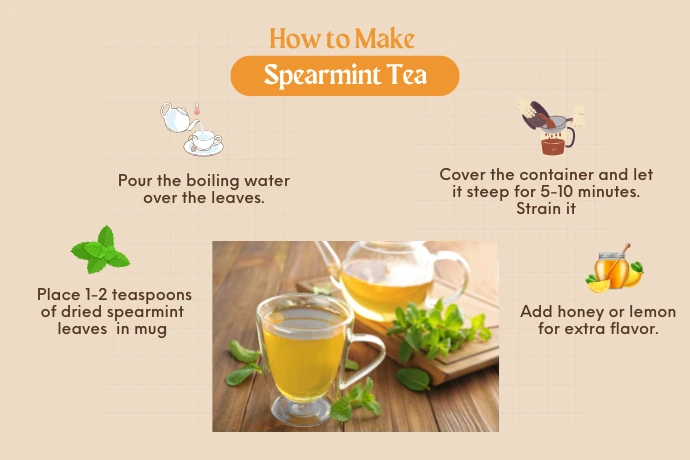
How to Make Spearmint Tea Taste Better?
- Sweeten it up: Add honey for extra sweetness
- Add Lemon: For a tangy taste, steep spearmint with a slice of lemon.
- Mix it up: For a cool twist, blend with herbal teas such as holy basil (tulsi).
- Add ginger: For a spicy digestive boost, add ginger slices.
- Serve iced: For a cool beverage, cool the tea and pour it over ice.
Side Effects of Spearmint Tea:
Spearmint tea and its supplements, including capsules and extracts, may not be suitable for everyone. Some people may not benefit from taking supplements containing extracts and capsules of spearmint.
The spicy and minty taste of these supplements might worsen symptoms for people with acid reflux or gastroesophageal reflux disorder (GERD). People who have liver or kidney problems or who are allergic to mint should also be careful.
It is also advised that women who are pregnant or breastfeeding consult a doctor before consuming spearmint supplements, including capsules.
So, Do you have to drink Spearmint Tea If you have PCOS?
The Bottom line is Spearmint tea isn’t an instant fix for reaching optimal testosterone levels. Still, it can help people with higher testosterone levels when paired with other PCOS-friendly practices like eating a diet high in fibre, protein, and healthy fats, getting enough sleep, controlling stress, and exercising frequently.
Frequently Asked Questions
What is Spearmint Tea Good for?
Spearmint tea is good for lowering stress, regulating hormones, and regulating the digestive system. It has a lot of rosmarinic acid and antioxidants, which reduce inflammation. In addition, menthol promotes relaxation and calms the mind, and its natural ingredients improve hormone balance.
Can You Drink Spearmint Tea During Pregnancy?
In small amounts, spearmint tea is safe to consume during pregnancy. It eases nausea, reduces bloating, and encourages relaxation. However, to be sure it's best for you and your child, always get advice from your doctor.
How to Make Spearmint Tea Taste Better?
Try using a slice of lemon or some honey for sweetness to enhance the flavor of spearmint tea. It can also be mixed with other herbal teas, such as holy basil (tulsi), to create a refreshing mixture.
When to Drink Spearmint Tea?
The best time to drink spearmint tea is either before bed for its calming effects or after meals to help with digestion. Drinking it throughout the day can help you relax and lower your stress levels.
Does Spearmint Tea Help with Acne?
Yes, drinking spearmint tea can help with acne. It contains strong anti-androgen properties, according to research, which may help those with hormonal acne. Regular use of spearmint tea may help produce cleaner skin by reducing the effects of androgens, which stimulate oil production and cause clogged pores and breakouts.
How to Make Spearmint Tea for PCOS?
To make spearmint tea for PCOS, steep 1-2 teaspoons of dried spearmint leaves in hot water for 5-10 minutes. Drinking this tea twice a day, preferably in the morning and evening, may help balance hormones and reduce PCOS symptoms like acne and excessive hair growth. Regular intake can support hormonal balance and overall health.

